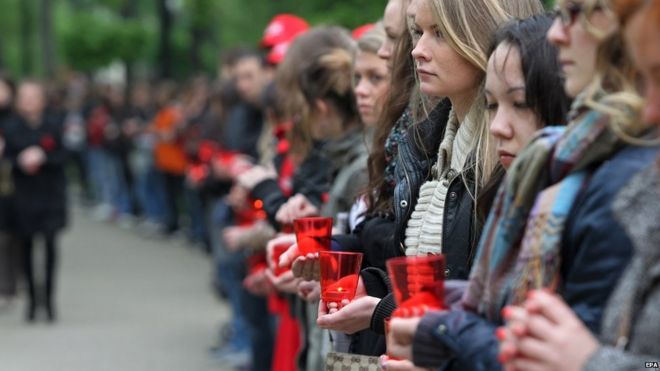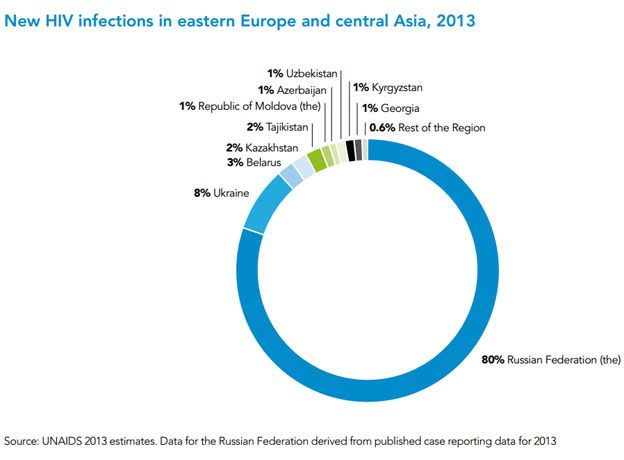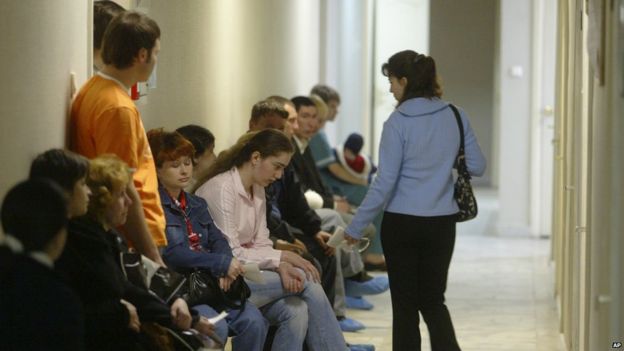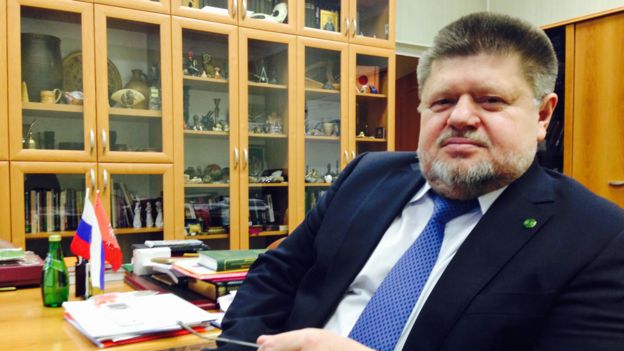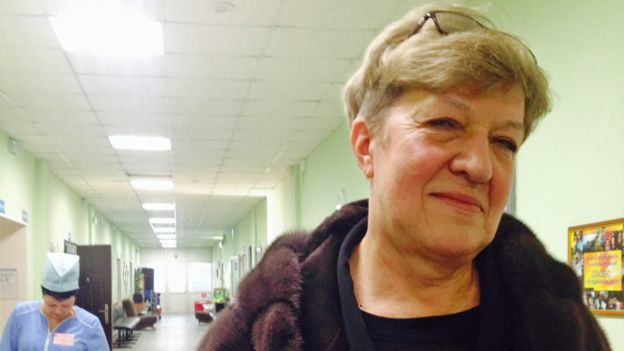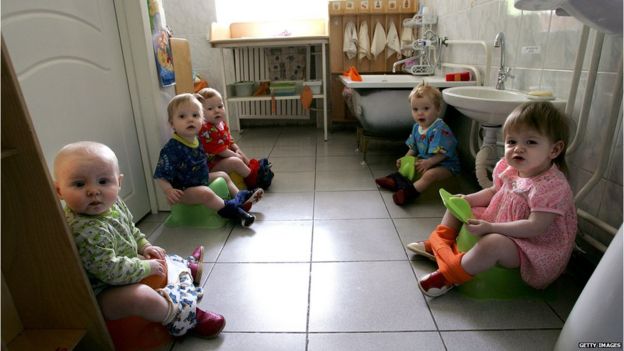Fighting HIV where no-one admits it's a problem
International AIDS Candlelight Memorial Day in Moscow, 2011
Hooked - Part 3
The phrase "Aids epidemic" awakens distant memories in most of Europe, Australia or the Americas, where infection rates have generally been in decline for years. But as former UK Health Secretary Lord Fowler explains, the phrase is not used in Russia either - despite failed policies that have allowed infection rates to soar.
For years Russia has remained remarkably silent on the challenge it faces from HIV and Aids. Now that silence has been broken by an epidemiologist who has been working in the field for more than two decades - and he calls the situation "a national catastrophe".
Vadim Pokrovsky, the softly spoken head of the Federal Aids Centre in Moscow, has watched as the figures have climbed remorselessly upwards.
There are about one million people living with HIV today in Russia and year on year the rate of infection is rising, unlike sub-Saharan Africa where the rate of increase is slowing. This is according to Russia's official figures, which almost everyone agrees are a substantial underestimate of the true position.
Last year some 90,000 Russian people contracted HIV, compared with fewer than 3,000 people in Germany, which has one of the lowest rates of HIV infection in Europe. Germany's population may be half the size of Russia's but the difference here is a factor of 30.
"We need to spend 10 times more on prevention," Pokrovsky told me recently. "We need many more resources and we need some political decisions - and changes in the law in connection with methadone and the private lives of individuals."
The trouble is that his diagnosis goes smack against the current ideology of the state and the increasingly powerful Russian Orthodox Church.
Catch up later on iPlayer Radio
Browse the Health Check archive
In an interview this month with Agence France-Presse he was even blunter, saying the Kremlin's policy of promoting traditional family values had failed to halt the spread of the virus. "The last five years of the conservative approach have led to the doubling of the number of HIV-infected people," he said.
When Pokrovsky argued for the introduction of sex education in schools - a step resolutely opposed by
presidential children's rights commissioner Pavel Astakhov - the head of Moscow City Council's health committee, Lyudmila Stebenkova, called him a "typical agent working against the national interests of Russia".
Pokrovsky's approach,
she told the Russian newspaper Kommersant, would only increase children's interest in sex and lead to a surge of HIV and other diseases.
"Instead of distributing condoms we should be promoting sexual fidelity and healthy families - that is much more effective," she said.
Yet the figures suggest otherwise. Pokrovsky has warned women that their chances of marrying an HIV-positive man are high.
"There are 80-100 cases of HIV infection among women a day. This is no joke - a day. They are mostly young women, aged from 25 to 35 years and they are the main new risk group," he told me.
Waiting room at a regional Aids centre in Russia
Almost 60% of those with HIV in Russia are injecting drug users and a further group are the sexual partners of the drug users. The HIV virus has spread like wildfire via contaminated needles and syringes.
That is why many countries around the world provide clean needles and methadone, which is taken orally, in place of drugs which are injected. When I was health secretary in the UK, that policy was started in 1987 and since then the numbers of people newly infected by contaminated needles have reduced almost to zero. The same results have been seen in a range of European countries and in Australia, which was an early pioneer of such policies to reduce the harm at-risk groups do to themselves and each other.
Yet in Russia methadone is banned. The World Health Organization may see the synthetic opiate as essential in combating heroin dependence, but in Russia anyone caught using it or distributing it can face up to 20 years in prison.
Health officials rely instead on narkologia, a traditional form of treatment that dates back to Peter the Great's attempts to fight alcoholism in the early 18th Century. In essence, this approach consists of isolating the drug user during a month of detoxification, followed up with rehabilitation - including lectures, self-help groups, physiotherapy, diet advice and so on.
Evgeny Brun, Russia's chief narcologist
The country's chief narcologist, Dr Evgeny Brun, is dismissive of replacement drugs. "Our professional joke is that methadone is similar to treating the vodka alcoholic with cognac," he told me with a chuckle.
It is true that methadone is also an addictive drug but if it comes from a healthcare source, in controlled doses and without needles, it often allows the drug-user to function reasonably and hold down a job. The glaring defect in the traditional Russian method of treatment is that all too often it does not work.
Global Aids epidemic in 2013
People living with HIV 35m - 31.8m adults and 3.2m children under 15
New HIV infections 2.1m - 1.9m adults and 240,000 children under 15
Aids related deaths 1.5m - 1.3m adults and 190,000 children under 15
When I toured the wards of the Moscow Research and Practical Centre of Narcology, there was no doubting the dedication of head doctor Elena Sokolchik.
The hospital on the outskirts of Moscow is considered one of the best facilities in the country, although only 10-15% of patients here go on to the voluntary course of rehab after their initial treatment.
Dr Sokolchik has been on a number of professional visits abroad but was troubled by what she saw. "When an addict comes - along with her children - to a centre where she can get methadone I feel that this is wrong and hypocritical. I don't want a kid to see addictive drugs distributed as if they were medicines," she says.
Elena Sokolchik, head doctor at the Moscow Research and Practical Centre of Narcology
Dr Sokolchik told me that she was proud of her record.
"I can tell you for certain that of our patients who go through the rehabilitation programme, 48% stay drug free for a year, 35% manage two years and 8% stay clean for eight years," she says.
But these statistics indicate that roughly half of those who go through rehab do not stay drug-free for a year, and say nothing about the 80% to 90% who do not stay for rehab. Survey after survey shows many patients are soon back on injecting drugs - and once again spreading the virus.
"Nobody believes me when I say that the Russian government is not doing any prevention work to stop the HIV epidemic," says Anya Sarang, head of the Andrey Rylkov Foundation - a small charity in Moscow which tries to promote better health for drug users.
"There is absolutely no effort to stop the epidemic among people who inject drugs and unsurprisingly Russia remains one of the few countries in the world where the HIV epidemic is still on the rise."
It is also true that no support is given to the handful of voluntary organisations trying to fill the gap. Sarang says that her small foundation is the only one doing harm-reduction work on the streets of Moscow. But it is an organisation which lives on a shoestring. It would dearly like a van to act as a mobile testing centre but that is beyond its resources - and volunteers have to lug their supplies around in rucksacks on the Moscow metro.
Infants at an orphanage for HIV-positive children in Moscow
There are some bright spots in the Russian landscape, though. A few miles outside St Petersburg there is a clinic for infectious diseases which was originally built as hospital for the poor by Tsar Alexander II in the 19th Century, and which now houses a special unit for children with HIV, some of whom have been orphaned or abandoned. The devoted work of the staff there has not only provided children with proper care but altered attitudes among people living nearby.
Back in the 1980s the fear was that HIV was infectious merely through touch or proximity. At one point, a petition was sent to President Boris Yeltsin calling for the clinic to be closed - and so it was, but only for 24 hours. Fortunately, wiser counsel intervened. Today the position is much improved and many children are eventually adopted.
But although discrimination against children with HIV has diminished, other prejudices remain very much alive. Adults with HIV can face ostracism. Sex workers caught carrying condoms are too often threatened with a charge of soliciting and forced to pay bribes to police. President Putin's legislation against the promotion of homosexuality encourages bigots, and makes it hard to get safe-sex advice leaflets printed.
Everyone agrees that the most important aim of global policy must be to persuade more people to step forward for HIV tests. But why should you come forward if you risk discrimination? At present only half of those around the world with HIV know their condition, so many will continue to spread the virus - and the battle against Aids is set back further.
Perhaps it is for these reasons that when asked about the outlook for an Aids-free Russia, Vadim Pokrovsky confesses he is not very hopeful. "Victory on HIV infection," he says quietly, "will require another 25 years."
http://www.bbc.com/news/magazine-32792830?ocid=socialflow_facebook















